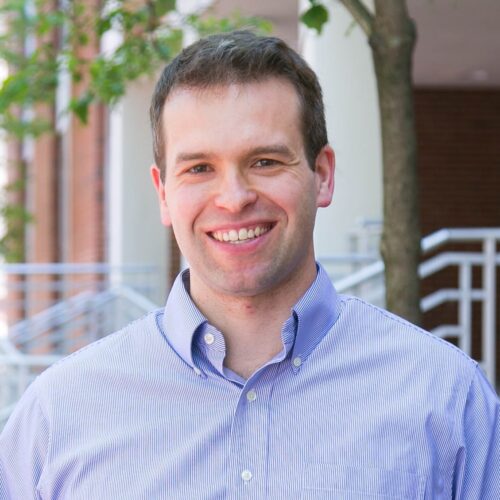Douglas Call

Bio
Dr. Call is an Associate Professor in the Department of Civil, Construction, and Environmental Engineering at North Carolina State University. Dr. Call is interested in biological and electrochemical processes to treat water and wastewater and recover resources from wastes. Watch a short video below to hear Dr. Call briefly explain his research focus.
Dr. Call received both his MS (2008) and PhD (2011) in Environmental Engineering from Penn State University. He continued as a postdoctoral scientist at Penn State until becoming an Assistant Professor of Civil and Environmental Engineering at Syracuse University in 2012. He is currently teaching CE 373 Fundamentals of Environmental Engineering, CE 378 Environmental Chemistry and Microbiology, and CE 573 Biological Principles of Environmental Engineering at NC State.
Dr. Call’s research focuses on technologies that recover resources from wastes and generate new resources using lower carbon footprints than conventional approaches. He has expertise in both biological and electrochemical principles. Examples of current research interests include: (1) “rewiring” anaerobic digestion to produce high-value chemicals, (2) developing hybrid microbial-material interfaces that quickly and thoroughly transform aqueous contaminants, (3) desalination of brackish water using capacitive deionization (CDI), (4) improving phosphorus removal from wastewater using biological approaches, (5) using electrochemical approaches to remove and recover carbon dioxide and metals from aqueous sources, and (6) conversion of nitrogen gas into ammonium using microbial electrochemical technologies.
Education
BS Environmental Sciences University of Virginia 2003
BS Civil Engineering Virginia Polytechnic Institute and State University 2005
MS Environmental Engineering The Pennsylvania State University 2008
Ph.D Environmental Engineering The Pennsylvania State University 2011
Area(s) of Expertise
Dr. Call's research focuses on technologies that recover resources from wastes and generate new resources using lower carbon footprints than conventional approaches. He has expertise in both biological and electrochemical principles. Examples of current research interests include: (1) "rewiring" anaerobic digestion to produce high-value chemicals, (2) developing hybrid microbial-material interfaces that quickly and thoroughly transform aqueous contaminants, (3) desalination of brackish water using capacitive deionization (CDI), (4) improving phosphorus removal from wastewater using biological approaches, (5) using electrochemical approaches to remove and recover carbon dioxide and metals from aqueous sources, and (6) conversion of nitrogen gas into ammonium using microbial electrochemical technologies.
Publications
- Biostimulation of Indigenous Ureolytic Microbes in Mature Fine Tailings for Reclamation: A Pilot Laboratory Study with Environmental Variables Considered , Geomicrobiology Journal (2025)
- Effects of Electrodialysis Physical and Operating Parameters on the Performance of an Anaerobic Digestion-Electrodialysis System for Volatile Fatty Acid Production and Recovery , ACS OMEGA (2025)
- Transdisciplinary Collaborations for Advancing Sustainable and Resilient Agricultural Systems , GLOBAL CHANGE BIOLOGY (2025)
- Cathodic precipitation of calcium carbonate and its impact on the electrosorption of sodium in flow-through capacitive deionization , DESALINATION (2024)
- Guidance on aqueous matrices for evaluating novel precipitants and adsorbents for phosphorus removal and recovery , Chemosphere (2024)
- Intermittent Heat Shocks Can Reduce Methanogenesis and Increase Generation of Longer-Chain Volatile Fatty Acids in Anaerobic Bioreactors , ACS ES&T ENGINEERING (2024)
- Stakeholder Views of Science and Technologies for Phosphorus Sustainability: A Comparative Analysis of Three Case Studies in Phosphorus Recovery in the US , SOCIETY & NATURAL RESOURCES (2024)
- The phosphorus challenge: biotechnology approaches for a sustainable phosphorus system , CURRENT OPINION IN BIOTECHNOLOGY (2024)
- Transdisciplinary collaborations for advancing sustainable and resilient agricultural systems , (2024)
- Formatotroph discovery and evolution for CO 2 utilization , 45th Symposium on Biomaterials, Fuels and Chemicals. SIMB (2023)